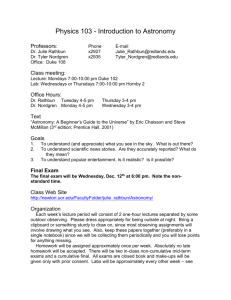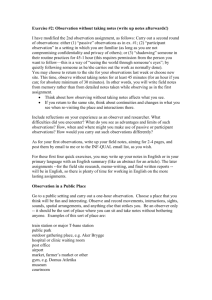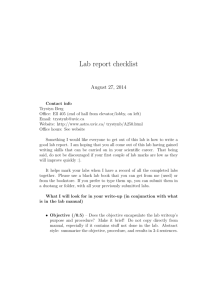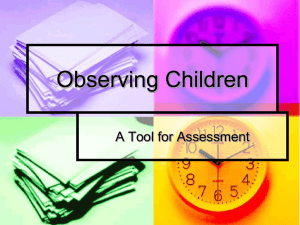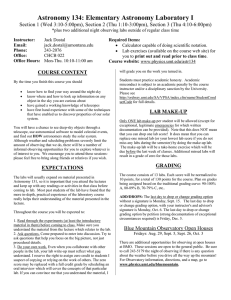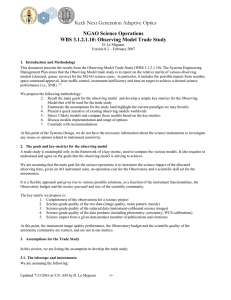ASTR 134N: Elementary Astronomy Laboratory I ...
advertisement
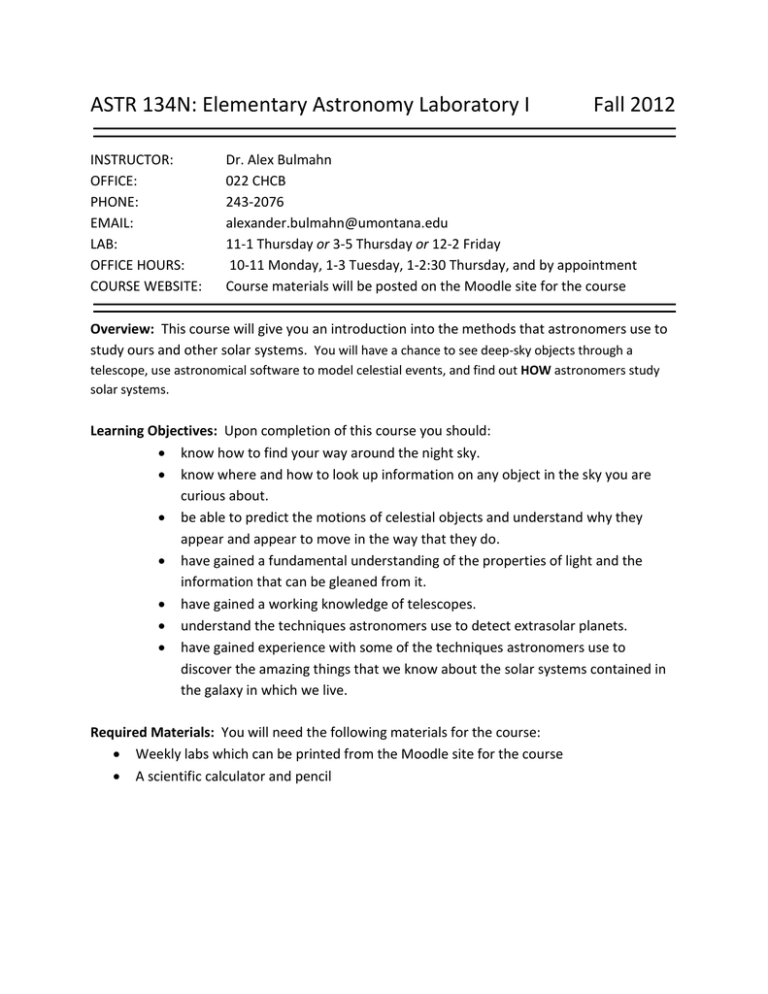
ASTR 134N: Elementary Astronomy Laboratory I INSTRUCTOR: OFFICE: PHONE: EMAIL: LAB: OFFICE HOURS: COURSE WEBSITE: Fall 2012 Dr. Alex Bulmahn 022 CHCB 243-2076 alexander.bulmahn@umontana.edu 11-1 Thursday or 3-5 Thursday or 12-2 Friday 10-11 Monday, 1-3 Tuesday, 1-2:30 Thursday, and by appointment Course materials will be posted on the Moodle site for the course Overview: This course will give you an introduction into the methods that astronomers use to study ours and other solar systems. You will have a chance to see deep-sky objects through a telescope, use astronomical software to model celestial events, and find out HOW astronomers study solar systems. Learning Objectives: Upon completion of this course you should: know how to find your way around the night sky. know where and how to look up information on any object in the sky you are curious about. be able to predict the motions of celestial objects and understand why they appear and appear to move in the way that they do. have gained a fundamental understanding of the properties of light and the information that can be gleaned from it. have gained a working knowledge of telescopes. understand the techniques astronomers use to detect extrasolar planets. have gained experience with some of the techniques astronomers use to discover the amazing things that we know about the solar systems contained in the galaxy in which we live. Required Materials: You will need the following materials for the course: Weekly labs which can be printed from the Moodle site for the course A scientific calculator and pencil Expectations: The labs will usually expand on material presented in lecture, so it is important that you attend lectures and keep up with any readings or activities in that class before coming to lab. Most past students of the lab have found that the more in-depth, practical experience of the laboratory course really helps their understanding of the material presented in lecture. Take advantage of laboratory time to explore topics, think critically, and ask good questions. Throughout the course you will be expected to: 1. Read through the experiments (at least the introductory material) before coming to class. 2. Ask questions. Come prepared to enter into discussion. Try to ask questions that help you focus on the big picture, not just procedural details. 3. Do your own work. Even when you collaborate with other people in the lab, your lab write-up must reflect what you understand. I reserve the right to assign zero credit to students that I suspect of copying or relying on the work of others. Grading: Your grade for the course will be based on completion of weekly labs, open lab quizzes over the previous week’s lab, and attending two mandatory night-time observing sessions. Lab Write-Ups: Before leaving lab, you must submit your write-up for review. Check +: 100% Everything complete and correct Check: 80% Complete and mostly correct Check -: 60% Incomplete, hurried work Zero: Either absent or forgot to submit your write-up for review The grading for the course will be broken down as follows: Lab Write-Ups: 25% Observing: 10% Quizzes: 65% Plan on letter grades being assigned based on the traditional grading curve: 100-90 % A, 89-80 % B, etc. There will be NO make-up opportunities for missed labs. Your lowest lab score will be dropped from your final grade. Note: the last day to drop the course via Cyberbear is September 17th. The last day to drop without the Dean’s signature is October 29th. Schedule: Week Dates Lab Notes 1 8/27—31 Introduction, Planetarium, and Star Charts I 2 9/3—7 Star Charts II 3 9/10—14 Sign-up for One Observing Session 4 9/17—21 Quantitative Reasoning: A Trip to Mars Night Observing Phases of the Moon 5 9/24—28 Sign-up for One Observing Session 6 10/1—5 Light, Color, and Filters Lunar Observing NO LAB 7 10/8—12 Lenses and Images Night Observing Backup 8 10/15—19 Bulk Density and Planet Composition 9 10/22—26 NO LAB 10 10/29—11/2 Solar Energy and the Habitable Zone 11 11/5—9 NO LAB 12 11/12—16 Surface of Mars 13 11/19—23 Thanksgiving Break: NO LAB 14 11/26—30 Radial Velocity Detection of Extrasolar Planets 15 12/3—7 16 12/10—14 Photometry and Extrasolar Planets: the Transit Technique Finals Week: NO LAB Lunar Observing Backup Academic Honesty: All students must practice academic honesty. Academic misconduct is subject to penalty by the course instructor and/or disciplinary sanction by the University. All students need to be familiar with the Student Conduct Code. The Code is available for review online at http://life.umt.edu/vpsa/documents/StudentConductCode1.pdf. Special Accomodations: Students with disabilities may request reasonable modifications by contacting me. The University of Montana assures equal access to instruction through collaboration between students with disabilities, instructors, and Disability Services for Students (DSS). "Reasonable" means the University permits no fundamental alterations of academic standards or retroactive modifications. For more information, please consult http://www.umt.edu/disability. Complaint Procedure: If anyone is having issues with the way that the course is being taught or the way that material is being presented I hope that you will come to me first to express your concerns. If you feel that you cannot come to me with these issues you can contact the chair of the department, Dr. Andrew Ware, 132 CHCB.
